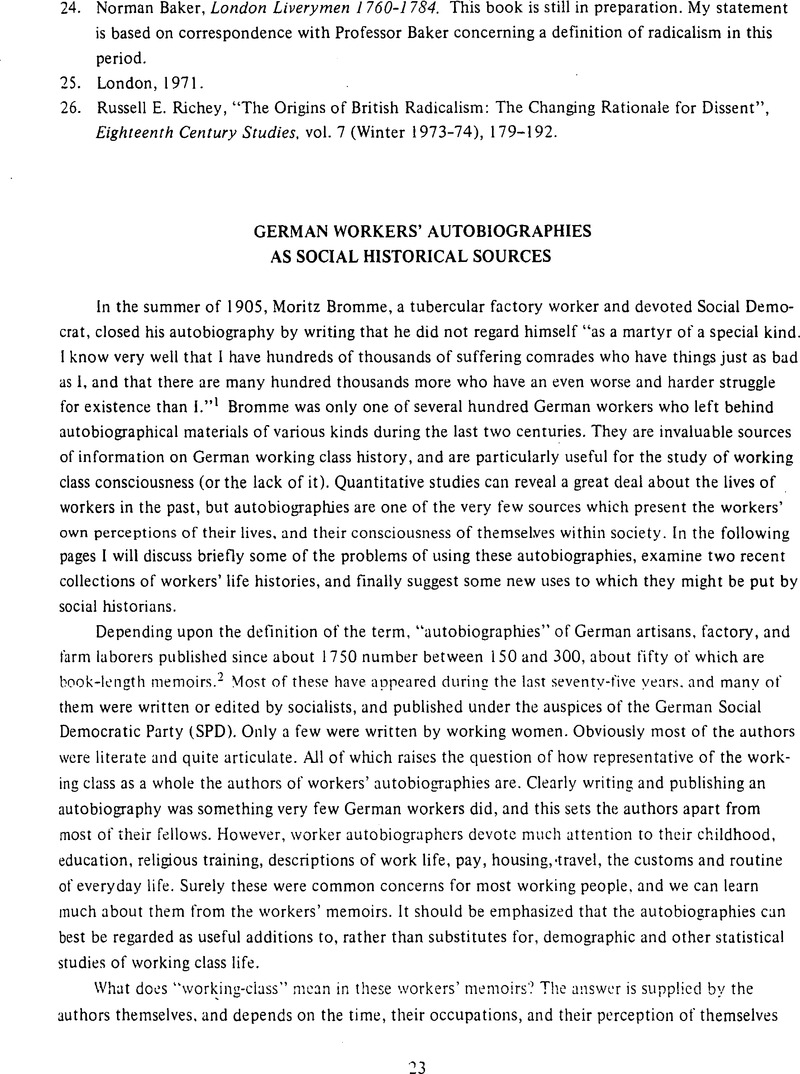Article contents
German Workers' Autobiographies as Social Historical Sources
Published online by Cambridge University Press: 16 December 2008
Abstract

- Type
- Essays
- Information
- Copyright
- Copyright © International Labor and Working-Class History, Inc. 1975
References
Notes
1. Moritz Bromme, Lebensgeschichte eines modernen Fabrikarbeiters (Jena, 1905, Reprinted, Frankfurt am Main: Athenäum Verlag, 1971), 368.
2. For bibliographies and detailed discussions of the problems of using worker autobiographies see Koch, Adelbert, “Arbeitermemoiren als sozialwissenschaftliche Erkenntinisquelle,” Archivfür Sozialwissenschaft und Sozialpolitik, 61 (1929), 128–167Google Scholar; Fischer, Wolfram, “Arbeitermemoiren als Quellen für Geschichte und Volkskunde der industriellen Gesellschaft,” Soziale Welt, 9 (1958): 288–298Google Scholar; Uhen, Leo, Gruppenbewusstsein und informelle Gruppenbildungen bei deutschen Arbeitern im Jahrhundert der Industrialiserung (Berlin, 1964), 25–31Google Scholar; Oberschall, Anthony, Empirical Social Research in Germany 1848–1914 (The Hague, 1965), 82–85Google Scholar; Neuman, R. P., “Industrialization and Sexual Behavior: Some Aspects of Working-Class Life in Imperial Germany,” in Bezucha, Robert, ed., Modern European Social History (Lexington, Mass., 1972), 272–276Google Scholar.
3. Also see Münchow, Ursula, “Das Bild des Arbeiters in der proletarischen Selbstdarstellung. Zur Bedeutung der frühen Arbeiterautobiografie,” Weimarer Beiträge, 19 (1973), 110–135Google Scholar.
4. Popp's is one of the few full-length worker autobiographies by a woman and is available in English translation. Popp, Adelheid, The Autobiography of a Working Woman (London: Fischer Unwin, 1912)Google Scholar.
5. Michels, Robert, “Psychologie der antikapitalistischen Massenbewegungen,” in Grundriss der Sozialökonomik (Tübingen, 1926), vol. 9, pt. 1, 271–274Google Scholar; Trunz, Cecilia, Der Autobiographien von deutschen Industriearbeitern (Freiburg i. Breisgau, 1934)Google Scholar; Fischer, Wolfram, Quellen zur Geschichte des deutschen Handwerks. Selbstzeugnisse seit der Reformationszeit (Göttingen, 1957)Google Scholar; Reichard, Richard, Crippled from Birth. German Social Democracy 1844–1870 (Ames, Iowa, 1969)Google Scholar; Hale, Oron, The Great Illusion 1900–1914 (New York, 1971), 43–46Google Scholar; Stearns, Peter, “National Character and European Labor History,” Journal of Social History, 3 (1970), 95–124CrossRefGoogle Scholar; Neuman, “Industrialization and Sexual Behavior.”
6. SeeBurnett, John, ed., Useful Toil. Autobiographies of Working People from the 1820s to the 1920s (London: Penguin, 1974)Google Scholar. Published in the United States as The Annals of Labour. Autobiographies of British Working Class People 1820–1920 (Bloomington: Indiana U. P., 1974).
- 1
- Cited by


